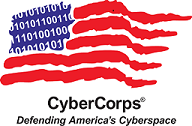ACES Scholarship
NSF CyberCorps® Scholarship for Service
UWF Argo Cyber Emerging Scholars (ACES)

The UWF ACES SFS program is no longer accepting applications. Please visit https://sfs.opm.gov/ for information on the national program, including other institutions accepting applications.

The NSF CyberCorps® Scholarship for Service (SFS) program aims to recruit and train the next generation of highly skilled cybersecurity professionals. The program's goal is a full student placement in government cybersecurity positions with at least 80 percent of scholarship recipients securing placement in an executive agency. Please visit www.sfs.opm.gov for additional information.
The Argo Cyber Emerging Scholars (ACES) program will establish a cybersecurity community of practice to grow and sustain a superior cybersecurity workforce through scholarships, professional development, high-impact learning practices, hands-on cybersecurity skills development, transfer pathways, and community and employer partnerships.
Scholarship Benefits
- Full tuition scholarship for up to two years: up to 30 credit hours per year for undergraduate students and up to 18 credit hours per year for graduate students (excluding summer)
- Annual stipend (for living expenses): $25,000 per year for undergraduate students and $34,000 per year for graduate students
- Professional allowance of up to $6,000 per academic year for SFS Job Fair and other travel, books, professional certifications, etc.
Scholarship Requirements
Program Participation Requirements
- Work in a Federal Executive Agency post-graduation for the number of years of the scholarship award. See Federal Executive and Non-Executive Agencies Listing.
- Complete one summer internship for at least 10 weeks, typically paid, with a government organization (Federal, State, Local, or Tribal) during the scholarship period.
- Participate in the annual CyberCorps® Scholarship for Service Job Fair, where SFS recipients meet government recruiters.
- Participate in research and professional-development events and activities, for example, research project, career preparation activities or seminars.
Applicant Preferences
Preference will be given for applicants who:
- Have a strong interest in working for an executive government organization.
- Hold security clearance or capability of obtaining security clearance.
- Actively involved in cybersecurity student organizations, competitions, research or other activities.
For more information, please visit the ‘Frequently Asked Questions’ on OPM website https://www.sfs.opm.gov/StudFAQ.aspx
Eligibility and Application Requirements
To be eligible for consideration for an SFS scholarship, a student must meet the following requirements:
- Minimum 18 years of age
- U.S. citizen or Lawful Permanent Resident (LPR)
- Enrolled full-time in one of the following UWF programs:
- BS in Cybersecurity
- BS in Computer Science
- BS in Information Technology
- MS in Cybersecurity
- MS in Computer Science
- MS in Information Technology
- PhD in Intelligent Systems and Robotics
- Minimum 3.25 / 4.0 overall GPA for undergraduate students or a minimum 3.25 / 4.0 overall undergraduate GPA for graduate students
- A GPA that does not meet the minimum requirement may be considered based on other application criteria.
- For undergraduate students: completed 60 or more credits (of the required 120) in the undergraduate degree program by the Fall semester that you will start the ACES program.
- Submit a 2-page letter of intent that demonstrates the student’s commitment to a cybersecurity career in government and includes the following components:
- commitment to a successful cybersecurity career in executive government
- experiences that helped prepare you for such a career, including academic courses and projects and extracurricular activities such as cyber competitions, research, certs or internships
- what the scholarship and stipend would allow you to accomplish that wouldn’t otherwise be possible
- what specific executive government organization(s) you are interested in working for after graduation and why. A list of the Executive Agencies is located here under Executive Branch Agencies, Commissions, and Committees.
- your short-term (1-4 years) and long-term (5+ years) career goals after graduation.
- Submit at least two letters of professional recommendation
- Submit a copy of your unofficial UWF transcript
Prospective students will also need to meet any other university-specific eligibility requirements AND meet criteria for federal employment, including the ability to obtain a security clearance, if required.
SFS Agreement
*A participant who fails to comply with any Program requirement will be indebted to the Federal Government and must immediately reimburse the SFS Program. Failure to promptly reimburse the SFS Program will require that the funds be collected as a debt owed to the U.S. Treasury. More information can be found in the SFS Service Agreement here:
SFS Agreement
Application
The UWF ACES SFS program is no longer accepting applications. Please visit https://sfs.opm.gov/ for information on the national program, including other institutions accepting applications.
For more information or questions about the program, contact:
Pam Davis, Program Coordinator
- ACES Program
- Center for Cybersecurity
- E-mail: aces@uwf.edu
ACES Program Team
- Dr. Eman El-Sheikh
Associate Vice President and Professor, Center for Cybersecurity - Dr. Hossain Shahriar
Associate Director and Professor, Center for Cybersecurity - Dr. Ezhil Kalaimannan
Associate Professor, Department of Cybersecurity - Dr. Caroline John
Instructor, Department of Cybersecurity
This material is based upon work supported by the National Science Foundation under Grant No.1946442. Any opinions, findings, and conclusions or recommendations expressed in this document are those of the author(s) and do not necessarily reflect the views of the National Science Foundation.







